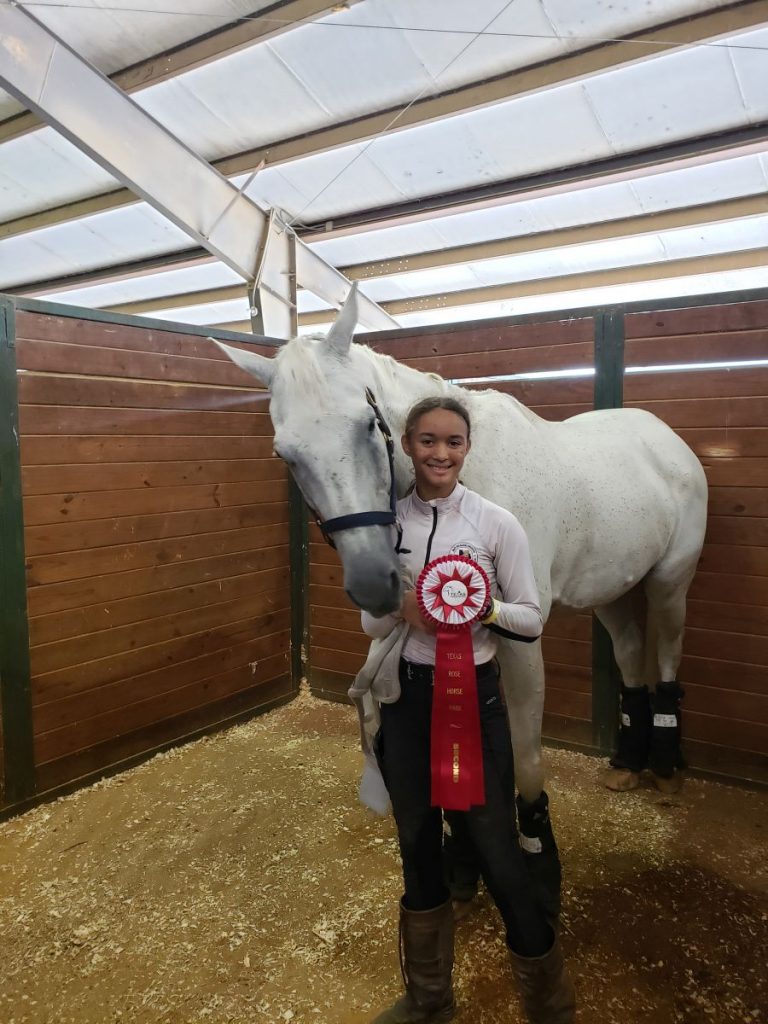In summer 2020, we launched a 1st Annual $5,000+ Diversity Scholarship with the support of generous donors, inviting minority equestrians to contribute to the discussion of diversity and inclusion in equestrian sport. It is the mission of this annual bursary, which we intend to expand in coming years, to call for, encourage, elevate and give a platform to minority voices in a space where they are underrepresented.
How do we build a more diverse, inclusive and accessible sport? In the coming weeks, we will explore this question alongside many of the 27 Scholarship recipients as they share with us their essays in full. Collectively, their perspectives coalesce into a body of work that will no doubt help inform a viable path forward for equestrian sport, and we are committed to connecting their actionable ideas with the public as well as leaders and stakeholders of the sport.
Today we welcome Katarina Stovall. More voices: Briannah Kaitlyn McGee | Lea Jih-Vieira | Scnobia Stewart | Kimberly Kojima | Helen Casteel | Lissette Williams | Christopher Ferralez | Malachi Hinton | Mitike Mathews | Katherine Un | Muhammad Shahroze Rehman | Dana Bivens | Leilani Jackson | Julie Upshur | Aki Joy Maruyama | Jen Spencer | Jordyn Hale | Dawn Edgerton-Cameron | Madison Buening | Caden Barrera | Deonte Sewell | Anastasia Curwood
 Photo courtesy Katarina Stovall.
Photo courtesy Katarina Stovall.
Diversity in the equestrian sport is a hot button topic these days. I am a 15-year-old, biracial eventer living in San Antonio, Texas. I am from a military family. My goal is to be a professional eventer. Generally speaking, I am in a diverse community most of the time thanks to the military. I do become aware that as I travel further away from the San Antonio area for shows that my environment becomes less diverse. At times my family struggles with the cost of the sport. I believe that if the sport were more affordable, more people would participate, including more minorities.
I am fortunate to have encouraging parents who are teaching me how to be successful. I have always had to work hard and think outside of the box as to how I can participate in the sport. In addition to my parents, I have had amazing mentors.
I am a proud member of the United States Pony Club. Pony Club gave me a strong foundation and work ethic. It gave me a chance to work with professionals and like-minded people. Most important, Pony Club allowed me to learn without owning my own mount and tack for quite some time. I have been fortunate to be able to lease horses and borrow tack. Instructors have allowed me to work off lessons, so my parents would have the money to pay for shows, hauling, clinics, or board.
A few years ago, I participated in the Dressage 4 Kids program. That organization helps kids have access to more affordable clinics and leases on school masters. I think if there were more organizations like this, it might make it more affordable for people to participate.
I realize how important it is for my mount to have fitting tack. Custom tack is expensive. Even used tack can be expensive. I have learned that the fit of my tack affects not only my horse’s performance, but my riding as well. I have an idea for a nonprofit organization that would give people access to good tack. The goal is to collect used tack from upper level riders as a donation. There could be an application for this tack to be used for a certain amount of time. This would buy someone time to purchase their own tack and learn what it feels like to ride in good tack.
If we could work to find more solution to make our sport more affordable, I believe that it will become more inclusive.
Nation Media wishes to thank Barry and Cyndy Oliff, Katherine Coleman and Hannah Hawkins for their financial support of this Scholarship. We also wish to thank our readers for their support, both of this endeavor and in advance for all the important work still to come.
Get involved! The idea of mentorship and access is one that permeates the conversation around equality within riding. The fact is that horse sports are expensive, and yet many of us successfully subsist on bare rations in order to feed our horse addiction. Is there a way to provide these opportunities to those who aren’t starting out with large amounts of financial support? Some of our other Diversity Scholarship recipients have talked about the idea of mentorship, including Dana Bivens, Dawn Edgerton-Cameron, Helen Casteel, Katherine Un, Kimberly Kojima, Lea Jih-Vieira, and Lyssette Williams.
Clearly, this is an important objective, and there are some organizations currently mobilizing to further these efforts. We look forward to providing more updates on this as they become available. In the meantime, take a moment to locate an access program nearby. Is there a way to establish a connection with your local riding community? Building bridges takes some effort, but those efforts can be rewarded not only by growing our sport, but by making the scope of our world just a little bit larger.
Zoom out! Katarina also talks about the importance of proper equipment. There are some programs dedicated to this, one of which is R.L. Jacobs’ From the Community, To the Community program. Gently used tack and apparel is donated to this community and made available to those without financial means for just a nominal donation. Take a look at this innovative program here.
